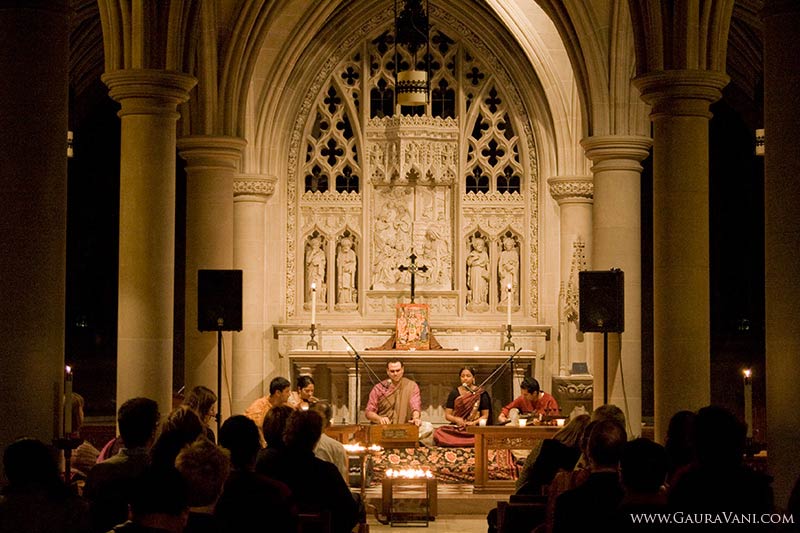Diwali Celebrated for First Time at U.S. National Cathedral
By ISKCON News Weekly Staff | Nov 22, 2008

Washington, D.C. – When the first large wave of Indian immigrants began to arrive to America more than forty years ago, few would have dreamed that they would one day see a Hindu holiday observed within the “National House of Worship.” On October 28, 2008 this dream indeed became reality when Washington National Cathedral hosted, for the first time in its history, an event in celebration of Diwali.
Rukmini Dasi, a Krishna devotee since 1968, has worked with the Cathedral to organize women’s interfaith programming in the past. Rukmini saw the opportunity for the Cathedral to recognize Diwali as part of the Sacred Circles interfaith programming at Cathedral Crossroads, and discussed the idea with Grace Ogden, Senior Program Manager at the Cathedral. Grace was enthusiastic about hosting the historic gathering.
“This year Diwali fell on a Cathedral Crossroads program night of interfaith spirituality so it was natural for us to celebrate this important festival,” said Grace, who worked with Rukmini to organize the event. “Experiencing the sacred practices of each other’s faiths is a key way to advance reconciliation and understanding, human qualities we need to cultivate more today than perhaps ever before.”
Almost 200 guests filled the Cathedral’s Bethlehem Chapel for the evening celebration, which featured the offering of diyas (traditional candles), the reading of sacred prayers, and the singing of heartfelt bhajans (devotional chants) accompanied by traditional Indian instrumentation. Beloved Vaisnava kirtaniyas Gaura Vani and As Kindred Spirits performed, along with special guest vocalist Vrindavana Vinodini Dasi, a second-gen ISKCON devotee from Canada.
Bethlehem Chapel, considered the cornerstone of the building, was the first completed chapel in the huge National Cathedral structure and has maintained its distinction as a groundbreaking place for worship and community. While the Cathedral is formally Episcopalian, it aims to be “a church for national purposes called to embody God’s love and to welcome people of all faiths and none.”
Diwali cuts across denominational, regional, and theological lines and is embraced as a day of celebration by all Hindus, as well as by Sikhs and Jains. Diwali has particular significance to devotees of Krishna because of its connection to various Vaisnava pastimes. The holiday commemorates Lord Ramachandra’s triumphant return to Ayodhya, and is also widely believed to be the day on which the famous pastime of Mother Yashoda tying Damodara to the wooden grinding mortar takes place. More generally, the occasion heralds the renewal of life and the triumph of the light of good over the darkness of evil.
For some, the significance of Diwali being observed at the Cathedral – designated the National House of Prayer by Congress, and host of state funerals and presidential prayer services – goes beyond the event itself.
“We’re seeing, perhaps for the first time in such a profound way, a Hindu holiday being acknowledged in the nation’s shared sacred space,” said ISKCON spokesperson Venkata Bhatta Dasa. “It is an exciting chapter in the story of how the faith has finally come to be welcomed into America’s pluralistic mainstream. ISKCON continues to be an important part of that story, so it is fitting that ISKCON devotees should play such a pivotal role in this historic event. If the Cathedral is America’s house of worship, so to speak, then we are being welcomed home to a room in that house.”
Images and audio from the event can be experienced at www.gauravani.com.















